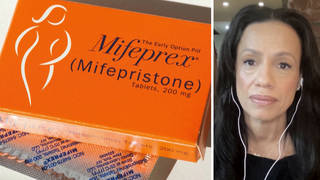
Related
Olympic track star Tori Bowie was eight months pregnant and in labor when she died on May 2, according to an autopsy. She was alone in her home at the time and may have suffered from respiratory distress and eclampsia, a rare but life-threatening pregnancy complication. Her baby also died. Bowie, a three-time Olympic medalist, was just 32 years old, and her death has led to an outpouring of grief and anger from friends and supporters who say it’s part of a larger Black maternal health crisis. Across the United States, Black women are three times more likely to die from pregnancy and childbirth complications than white women. “What they’re failing to do is listen to Black women,” says Dr. Carla Williams, a doula and OB-GYN who says she opted for home births after a negative hospital experience with her first pregnancy. “More work needs to be done in order to take care of the birthing population the way that it should be.”
Transcript
AMY GOODMAN: This is Democracy Now! I’m Amy Goodman, as we end today’s show looking at the death of Olympic track and field star Tori Bowie and an often ignored issue: the Black maternal health crisis. Tori was just 32 years old when she died at home last month. The Orange County, Florida, medical examiner reported she was eight months pregnant and in labor when she died, most likely from eclampsia, a complication of pregnancy. Tori Bowie, who was Black, won bronze, silver and gold medals in the 2016 Olympic Games in Rio de Janeiro. The CDC recently marked Black Maternal Health Week in April, noting Black women are three times more likely to die from pregnancy complications than white women.
We’re joined now by Dr. Carla Williams, board-certified OB-GYN, who opted to have home births herself — an OB-GYN — after her first hospital birthing experience. She’s also a birth and postpartum doula.
Thank you so much for being with us. Can you talk about the significance of this enormous disparity between white women and Black women dying in or before or right after childbirth, Dr. Williams?
DR. CARLA WILLIAMS: Yes. Thank you so much for having me.
It’s just — it’s incredible, the disparities that you’ve mentioned and just how Black women are dying throughout the country, in New York state, in New York City especially, where it’s up to 12 times more than white women. And it goes to show just that these patients, these women, their concerns aren’t necessarily being heard. There is bias and there’s racism within our medical institutions. And something needs to change drastically.
AMY GOODMAN: I mean, I wanted to read Bowie’s Olympic teammate Tianna Bartoletta’s tweet, which is just stunning, after learning of her death. She said, “As of June 2023…3 of the 4 members of Team USA’s 4×100m relay team…who ran the SECOND fastest time in history, and brought home THEE gold medal…have nearly died or did die in childbirth. We deserve better. #BlackMaternalHealthCrisis.” Dr. Williams?
DR. CARLA WILLIAMS: Right. It’s unacceptable. You know, it’s saddening, and it’s maddening at the same time, that this is happening to Black and Brown women and that, essentially, nothing really can save you. You can be extremely well educated, you can be, quote-unquote, “high-class,” you can have all the money in the world, you can be, you know, record artists and Olympic medal-winning athletes, and really nothing can spare you.
AMY GOODMAN: And, I mean, the fact, Dr. Williams, that you’re an OB-GYN, that you yourself had two births at home after your first hospital experience — why? And how do you relate that to the disparities we’re talking about?
DR. CARLA WILLIAMS: Well, why, essentially, what made me make that decision was having a bad experience with the birth of my first child in the hospital and experiencing discrimination within that stay. So, when that happened to me, even being an OB-GYN at that time, and feeling like I was getting subpar care and that my child was, I felt like, definitely, moving forward, out-of-hospital birth was what I wanted to choose for myself in order to have the best outcome. So, when I think about that, I think that every woman, every birthing person deserves to have an experience where they’re taken care of, they’re listened to, their concerns are validated, and their best interest is at mind. So, that’s —
AMY GOODMAN: What is it that doctors are missing? What is it that hospitals are not doing correctly? And what does this have to do with recognizing the pain of Black women?
DR. CARLA WILLIAMS: I feel like what they’re failing to do is listen to Black women. I feel like they’re not listening to their complaints. I feel like they’re taking things too lightly. I feel like they’re intervening too much when maybe it’s not necessary. I feel like there is not enough collaboration in the care with, for example, midwives that could be taking care of low-risk pregnancies and giving them more one-on-one attention that those patients need. I feel like there has to be more — there has to — more work needs to be done in order to take care of the birthing population the way that it should be, where, you know, high-risk pregnancies and whatnot is taken care of by more specialized providers, and we’re taking care of low-risk pregnancies with midwives.
AMY GOODMAN: I want to end your words on Instagram, Dr. Williams. You wrote, “We need to start measuring outcomes on more than just being alive. That is the baseline. The goal is EMPOWERED and healthy.”
Dr. Carla Williams, OB-GYN, birth and postpartum doula, had two of her children at home after her first hospital experience, as we continue to cover the issue of the disparity in the lives of Black and white women, mothers. That does it for our show. I’m Amy Goodman. Thanks so much for joining us.












Media Options